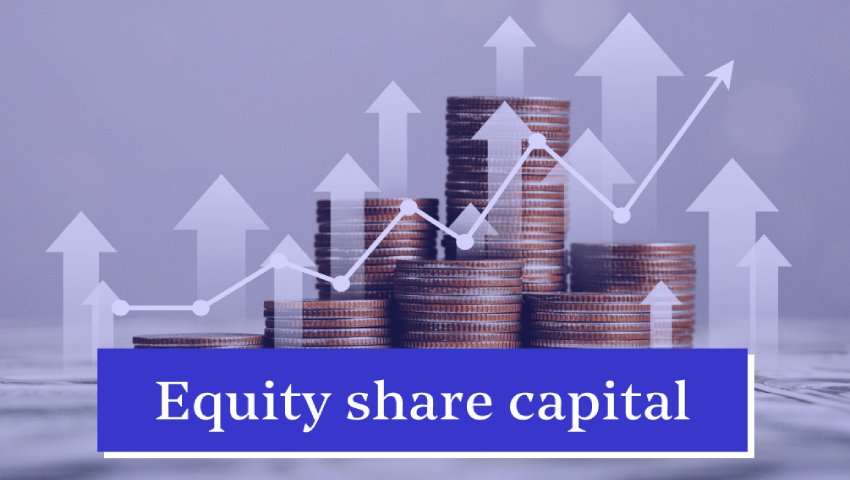
- 11/06/2025
- MyFinanceGyan
- 827 Views
- 3 Likes
- Share Market
Equity Share Capital: Meaning, Types, Benefits & Risks
Every company needs adequate capital to sustain and grow its operations. At times, businesses may face financial constraints and require additional funding to maintain smooth operations. One of the most common ways to raise such funds is through equity share capital.
Equity share capital is a crucial component of a company’s financial structure and plays a vital role in its long-term sustainability and growth. In this article, let’s understand what equity share capital means, its types, benefits, and the risks involved.
What Are Equity Shares?
Equity shares, also known as ordinary shares, represent fractional ownership in a company. When an investor purchases equity shares, they gain a part of the company’s ownership. These shares serve as a long-term source of capital for companies and offer certain rights and benefits to shareholders.
Key Benefits of Equity Shares for Shareholders:
- Liquidity: Equity shares are tradable on stock exchanges, offering fair liquidity. Their value fluctuates based on market trends and the company’s performance.
- Profitability: Shareholders can earn through capital appreciation and periodic dividends.
- Influence in Management: Shareholders with significant holdings can participate in company decisions and have voting rights.
What is Equity Share Capital?
Equity share capital refers to the capital raised by a company through the issuance of equity shares. It is the fund contributed by shareholders (owners/investors) which the company can use to start, expand, or support business operations.
This capital helps companies not only in managing operations but also in improving their market credibility and financial standing.
Why Do Companies Issue Equity Shares?
Companies issue equity shares for several reasons, the most prominent being:
- To raise capital for business expansion, product development, or operations.
- To go public, especially for large private companies aiming to list on a stock exchange.
- To diversify ownership and improve corporate governance.
- To reward stakeholders, including employees (through sweat equity).
By issuing equity shares, companies allow investors to buy a stake in the business and earn a share in its profits through dividends and appreciation in share price.
Types of Equity Share Capital:
Companies can issue different types of equity shares depending on their capital needs. Below are the major classifications:
Risks Associated with Equity Share Capital:
While equity share capital is a powerful tool for raising funds, it comes with its own set of challenges and risks:
- Lack of Investor Interest: Investors today are well-informed and evaluate investment options based on market trends, profitability, and future prospects. If a company fails to appeal to investors, its shares may remain unsubscribed, resulting in inadequate capital inflow.
- Insufficient Capital Raised: Even if shares are subscribed, companies may not raise enough capital due to stiff competition in the stock market. With many investment options available, attracting substantial funds becomes difficult.
- Higher Dividend Liabilities: When companies issue too many shares, they may end up with an unmanageable number of shareholders. This can increase the dividend payout obligations, leading to a higher financial burden and reduced sustainability.
How to Calculate Equity Share Capital?
Equity Share Capital can be calculated using the following formula:
Equity Share Capital = Number of Outstanding Shares × Face Value per Share
Or more accurately,
Equity Share Capital = (Number of Shares × Par Value) + Paid-in Capital in Excess of Par
Why is Equity Share Capital Called Risk Capital?
Equity share capital is often referred to as risk capital because the returns for shareholders are not fixed. Investors bear the risk of company performance — if the business performs well, shareholders benefit from higher dividends and share price appreciation. However, in case of losses, they may not receive any returns at all.
FAQs on Equity Share Capital:
Equity share capital is the portion of a company’s capital raised by issuing equity shares to investors who, in return, gain ownership in the business.
It is calculated by multiplying the number of outstanding shares with the face value per share or by adding the paid-in capital to par value.
Liquidity, potential for dividend income, and voting rights in company decisions.
Some key types include authorised capital, issued capital, subscribed capital, paid-up capital, right shares, sweat equity shares, and bonus shares.
Yes, because returns are dependent on the company’s profits and market conditions.
Final Thoughts:
Equity share capital plays a vital role in a company’s growth story. While it provides businesses with the necessary funds, it also invites scrutiny, expectations, and responsibilities towards shareholders. For investors, equity shares offer a chance to participate in a company’s success, but they must be mindful of associated risks.
Whether you are a company looking to raise funds or an investor considering purchasing shares, understanding the dynamics of equity share capital is essential for informed decision-making.
Disclaimer:
The views shared in this article are for educational purposes only and do not constitute financial advice or product recommendations.



